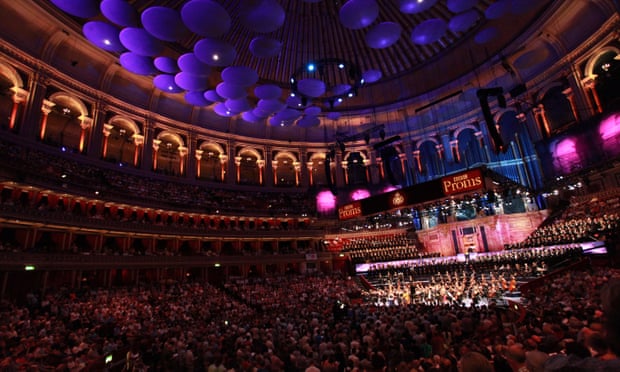UK ‘risks exodus of talent’ from creative sector due to coronavirus
The UK risks an exodus of talent from its creative sector, leading arts organisations and industry bodies have warned, as they call on the chancellor to extend financial support for freelancers until 2021.
Indoor live performances in England were given the green light from 15 August as part of the easing of Covid-19 restrictions. However, professional body the Incorporated Society of Musicians, and performing arts union Equity, fear venues will struggle to reopen because smaller audiences mean less profit from ticket sales.
They are asking for the Treasury’s self-employment income support scheme (SEISS), which in its second round will award individual grants of up to £6,570, to run until spring 2021 – far beyond its current cut-off date of 19 October.
The Brit School, UK Theatre, the Society of London Theatre, the Glyndebourne Tour Orchestra and the London Symphony Orchestra are among the high profile signatories to the letter sent to the chancellor, Rishi Sunak.

Bund fördert Musikveranstalter
Im Rahmen des Milliardenpakets zur Stützung für die Kulturszene in der Coronakrise fördert der Bund Musikfestivals und Livemusik-Veranstalter mit bis zu 80 Millionen Euro. Insgesamt seien rund 150 Millionen Euro für die Musikbranche vorgesehen, hieß es am Mittwoch in einer Mitteilung. Weitere Hilfen für Clubs und Livemusik-Spielstätten, Musikverlage und Musikfachhandel seien geplant.
„Seit Beginn der Corona-Krise finden nahezu keine Konzerte mehr statt, auch der Festival-Sommer musste fast komplett ausfallen“, sagte Kulturstaatsministerin Monika Grütters (CDU). Dadurch seien viele kleine und mittelständische Unternehmen der Live-Branche in ihrer Existenz bedroht. Ziel der Förderung sei es, „die immense Vielfalt unseres Musiklebens in den Metropolen, den Städten und auf dem Land abzusichern“. Musikfestivals können bis zu 250.000 Euro erhalten, Veranstalter von Livemusik-Programmen bis zu 800.000 Euro.

Federal government supports music organizers
As part of the billion-euro package to support the cultural scene in the Corona crisis, the German government is providing up to 80 million euros in funding for music festivals and live music events. A total of around 150 million euros has been planned for the music industry, according to a statement issued on Wednesday. Further aid for clubs and live music venues, music publishers and music retailers is planned.
“Since the beginning of the Corona crisis, there have been almost no concerts and the festival summer had to be cancelled almost completely”, said Minister of State for Culture Monika Grütters (CDU). This, she said, threatened the existence of many small and medium-sized companies in the live music industry. The aim of the support is “to secure the immense diversity of our music life in the metropolises, the cities and in the countryside”. Music festivals can receive up to 250,000 euros, organizers of live music programs up to 800,000 euros.
Roselyne Bachelot favorable à la fin de la distanciation dans les salles de concert
Les représentants du spectacle vivant ont commencé mercredi à rencontrer la ministre de la Culture, Roselyne Bachelot qu’ils décrivent « à l’écoute », soucieuse de « la reprise » d’activité, soit un « motif d’espoir » dans le contexte sanitaire actuel.
Les professionnels demandent l’abandon de la distanciation mais le port du masque obligatoire. « Mme Bachelot a bien compris notre point de vue, c’est un motif d’espoir: pour nous, la distanciation impose des jauges trop dégradées, nous devons avoir des jauges à 85% », a rapporté Malika Seguineau, du Prodiss (Syndicat national du spectacle musical et de variété). La 1ère organisation patronale du spectacle musical dans le privé a donc demandé « à faire évoluer les règles sanitaires », en abandonnant par exemple, quand c’est possible, la distanciation (spectateurs séparés par des sièges vides, etc), avec en contrepartie un port du masque obligatoire.
« Nous croyons dans la responsabilité des spectateurs, comme quand ils prennent le métro, le train, l’avion, comme quand ils reprendront le chemin du bureau en septembre ».
La ministre a été « à l’écoute, elle souhaite la reprise (d’activité) et nous a dit qu’elle ne cesse d’échanger avec Matignon, l’Elysée, Bercy; elle connaît bien la machine de l’État », a précisé Malika Seguineau. « Cela nous redonne du baume au cœur, on sent une volonté de défendre ce qui est possible », ajoute Pierre-Alexandre Vertadier, producteur de concerts, qui n’a pas rencontré la ministre mais s’est informé auprès de ses représentants.

Roselyne Bachelot in favour of ending distancing in concert halls
Representatives of the performing arts began Wednesday to meet the Minister of Culture, Roselyne Bachelot, whom they described as “listening”, concerned about the “resumption” of activity, a “reason for hope” in the current health context.
The professionals ask for the abandonment of distancing but the wearing of a mask is compulsory. “Ms. Bachelot has understood our point of view, which is a reason for hope: for us, distancing imposes gauges that are too degraded, we must have gauges at 85%,” said Malika Seguineau of Prodiss (Syndicat national du spectacle musical et de variété). The leading employers’ organization of musical entertainment in the private sector has therefore asked “to change the health rules”, by abandoning, for example, when possible, distancing (spectators separated by empty seats, etc.), with in return a mandatory wearing of masks.
“We believe in the responsibility of the spectators, as when they take the metro, the train, the plane, as when they go back to the office in September”.
The Minister was “listening, she wants to get back to work and told us that she is constantly talking with Matignon, the Elysée, Bercy; she knows the machinery of state well,” said Malika Seguineau. “This gives us a balm in our hearts, we feel a willingness to defend what is possible,” added concert producer Pierre-Alexandre Vertadier, who did not meet with the Minister but asked her representatives.
 BACK
BACK